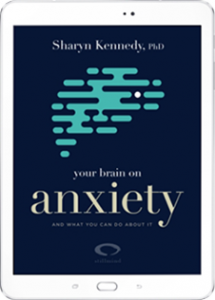This website uses cookies so that we can provide you with the best user experience possible. Cookie information is stored in your browser and performs functions such as recognising you when you return to our website and helping our team to understand which sections of the website you find most interesting and useful.
Is My Anxiety Real?

Is My Anxiety Real?
Your anxiety is very real. Everything you feel is real. Everything that affects your thoughts and behavior is real. If it has a real effect on your life, how could it not be real?
Some people feel like they shouldn’t experience anxiety. That’s nonsense. Everyone experiences anxiety to some degree. For some, it’s an apprehensive feeling when they go to the dentist or have an important meeting. For others, it’s much more severe.
Either way, it’s real, and while it can be a real problem. It doesn’t mean you’re broken and it doesn’t mean you’re stuck.
Why do I feel This Way?
Anxiety is one step away from the fight/flight/freeze instinct we experience when we face a threat. Anxiety is the anticipation of feeling something unpleasant or uncertain.
When we’re anticipating something unpleasant—like a trip to the dentist—we feel anxiety. Our brains want us to feel safe, and there’s nothing about lying back as someone pokes at your teeth that feels safe.
Similarly, our brains crave predictability, so if an upcoming situation is uncertain, like a sales meeting with an important client, we can feel anxiety just because the outcome is unknown. Additionally, our brains sometimes assume predictability so if a social situation has gone poorly before, we feel anxiety before doing it again because there’s a part of our brain that assumes it will go poorly effect.
Anxiety’s Negative Feedback Loop
Does this sound familiar? You’re a bit apprehensive about an upcoming appointment. You notice your heart starts to race a little and you think it’s ridiculous that you’re feeling anxiety over something this trivial. You get a lump in your throat because you hate feeling anxiety. You feel like you’re always anxious about ridiculous things and wonder why you can’t be normal. Your palms start to sweat and you start thinking of ways you can get out of the appointment.
That’s normal.
What’s happening is that your thoughts, feelings, bodily sensations, and behaviors are engaged in a negative feedback loop.
When you notice that your heart’s racing a little bit, you think it’s wrong to feel that, so you feel worse, think about feeling worse, and over and over until the appointment you were feeling a little anxious about has become a threat that must be avoided at all costs.
Avoidance Behavior
You probably haven’t thought about a pink polar bear in the last several minutes. You may never have thought about a pink polar bear, but if I ask you not to think about a pink polar bear for three minutes, you know what you’re going to do?
You’re going to think about a pink polar bear.
When we try to avoid thinking about something, we almost invariably think about it. It’s called the Rebound Effect and it contributes mightily to extreme anxiety.
The more you think about anxiety, the more you feel it, but trying not to think about it makes you think about it. It’s a problem, and the solution our brains have come up with is avoidance behaviors.
Avoidance behaviors can be anything from sleeping and avoiding social situations to not doing routine chores like paying the bills. They’re all just techniques your brain has adopted to avoid feeling anxious—temporarily.
Am I Stuck Like This?
Absolutely not.
I mentioned earlier that our brains crave predictability. They build habits that they can run on autopilot so they don’t have to do as much work.
That spiral of negative thinking and feeling that leads to extreme feelings of anxiety? That’s a habit.
That avoidance behavior you’ve adopted to easy the anxiety temporarily? That’s a habit.
Habits are hard to break, but they aren’t impossible. People end bad habits every day. They start healthy and productive habits every day. It’s a hard thing to do and you’re probably going to need professional help, but you can do this. You can retrain your brain. You can develop habits that cut off anxiety before it gets intense. You can get your life back.
The Reactive Brain and the Rational Brain
As humans, we have two brains. The habits that are making life difficult live in the Lizard Brain or the Reactive Brain. It’s in charge of our immediate reactions to experiences. It takes care of the fight/flight/freeze reflex and governs how we feel about things.
Our other brain is our Rational Brain. It does the thinking and planning so we can act how we want to act. When we’re shopping for groceries and we look at ingredient lists and nutritional information, we’re using our Rational Brain. When we grab a candy bar at the checkout counter, we’re using our Lizard Brain.
The reflexive ramping up of anxiety and avoidance behaviors are both habits instilled by our Reactive Brains. To break those habits, we have to use our Rational Brain to override our Reactive Brain.
Cognitive Behavioral Therapy
In psychology, we have a tool to do that. We call it Cognitive Behavioral Therapy or CBT.
What you do when you practice CBT is to interrupt your Reactive Brain when you first feel anxiety so those old habits don’t kick in. You’re not going to try not to feel anxiety. That would be fruitless.
Instead, you’re going to let your Rational Brain take over and observe what you’re thinking and feeling without judgment. If you’re feeling anxious about an upcoming appointment, you’ll recognize that you’re feeling anxious, but instead of feeling bad because you’re anxious, you’ll ask yourself whether that anxiety is warranted.
Sometimes it is. Anxiety about unpleasant or uncertain things is natural. Sometimes it isn’t. Regardless, you won’t judge. You’ll let yourself feel what you feel, but instead of responding habitually, you’ll choose how you respond.
Instead of berating yourself for feeling anxiety where others don’t, you’ll remind yourself that you can’t always tell what someone else is feeling, that anxiety is normal and that facing the situation directly is the best way to resolve any uncertainty.
Instead of engaging in avoidance behavior, you’ll tell yourself to tackle the situation head-on and get it resolved so you can stop feeling anxious about it.
It won’t be easy. It won’t be quick. Habits are hard to break and hard to build. You won’t always be successful in interrupting your habitual responses, but the more you practice and the more you keep at it, the more successful you’ll be.
In time, you’ll be living your best life.
What do I do Next?
I would be honored to help you retrain your brain. I even have a course you can take online from the comfort of your own home that covers the first steps you’ll go through with any psychologist.
But the first step is to buy and read my book Your Brain on Anxiety and What You Can Do About it. It discusses what we’ve discussed here, but in much greater depth and includes some steps you can take starting today that will put you on the road to living your best life. Click the book image below to go straight to checkout.
Categorised in: Uncategorized.





